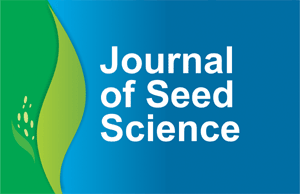Abstract:
Productive soybean genotypes is one of the main objectives of soybean breeding programs. However, there are few studies on the selection of characteristics associated with the quality and performance of soybean seeds. The objective in this study was to predict physiological and genetic parameters associated with seed quality in segregating soybean populations derived from parents of differing maturity groups. Eight genotypes of the F2:3 segregating soybean population (numbered 163, 24, 57, 108, 164, 169, 157, and 81) cultivated in the 2018/19 harvest were evaluated. To conduct the experiment, a completely randomized design was used. The physiological quality of the seeds was evaluated by germination test, tetrazolium test, and image analysis. Statistical analyses were performed by using a mixed model approach. Greater seed vigor was observed in the genotypes 108, 164, and 169, whose results were among the best for most of the analyzed parameters. The greater mechanical damage and damage due to stink bugs can explain the lower vigor of some seeds, as observed in genotypes 57 and 163, while weathering damage did not correspond to the results of the seed vigor tests. The analyses indicated a greater influence of genetic characteristics than of relative maturity group on the responses of the genotypes. No effect of relative maturity group on soybean seed vigor was evident.
Index terms:
Glycine max L. Merrill; plant breeding; REML/BLUP; seed physiology

 Thumbnail
Thumbnail
 Thumbnail
Thumbnail
 Thumbnail
Thumbnail


